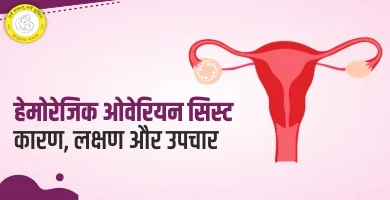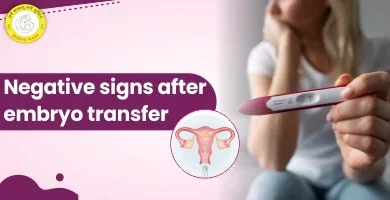Fallopian Tube Blockage Treatment: What You Need to Know

Women don’t always realize that they have a blocked fallopian tube until they are having trouble getting pregnant. However, Fallopian Tube Blockage issues can account for as much as 30% of infertility among women. There are fallopian Tube blockage treatment available to help with infertility caused by blocked or scarred tubes.
In this Article
What you need to know about this condition. Find out where it comes from, how it is treated, and what you can try to improve your chances of becoming pregnant.
What is a Blocked Fallopian Tube?
The female reproductive system is connected by a fallopian tube between the ovaries. The fallopian tube is responsible for transporting the egg from the ovary into the uterus. Every month, it happens in the middle of menstrual cycles. Conception occurs in the fallopian tubes.
Fertilization is the meeting of an egg and sperm in the fallopian tubes. The embryo is transported to the uterus via the fallopian tubes after fertilization. The fallopian tubes are the meeting place for egg and sperm and the path to the uterus of the fertilized embryo. The whole process will be disrupted if the passage is blocked. Scar tissue, pelvic adhesions, and infection cause Fallopian Tube Blockage.
Causes of Fallopian Tube Blockage
A variety of factors can cause blocked fallopian tubes. The most common are:
1. Uterine Fibroids
It is also called uterine myoma. This is an abnormal growth of tissues in the uterus that causes severe pelvic pain and vaginal bleeding. These symptoms may also lead to tubal scarring, which can cause a blockage.
2. Pelvic Inflammatory Disease (PID)
This is an infection of the Fallopian Tube Blockage, ovaries, or uterus. PID may cause fluid buildup and scarring, which can increase the risk of fallopian tubes becoming blocked.
3. Endometriosis
When endometrium tissue grows beyond the uterus, it is called Endometriosis. This abnormal growth can cause severe abdominal and pelvic pain, as well as vaginal bleeding. Endometriosis symptoms can lead to scarring of the fallopian tube, resulting in Fallopian Tube Blockage.
4. Sexually Transmitted Infections (STIs)
Gonorrhea, chlamydia, and other STIs can cause scarring or blockage of the fallopian tubes.
5. Treatment of Ectopic Pregnancies
Ectopic pregnancy occurs when the fertilized ovary implants abnormally outside the uterus. This can cause scarring of the fallopian tube, resulting in blockage.
Symptoms of Fallopian Tube Blockage
Many women remain unaware of a fallopian tube blockage until they experience difficulty conceiving. Below are the key symptoms of fallopian tube blockage:
1. Abdominal or Back Pain
It is a common occurrence, usually around the time that women get their period. This occurs because fluid builds up in the fallopian tubes and causes a condition known as hydrosalpinx.
2. Vaginal Discharge
It is possible to get pregnant even if the fallopian tube is partially blocked. This can increase the chance of an ectopic birth. A fertilized egg can implant outside the uterus in the fallopian tube. The egg can get stuck in the tube if it is partially blocked.
Diagnosis of Fallopian Tube Blockage
It can be hard to tell if your fallopian tubes are blocked. Tubes can close and open, so it’s sometimes clear if the tubes are blocked.
Three key tests are used to diagnose a blocked fallopian tube:
• A hysterosalpingogram, or HSG Test, is an X-ray. The doctor injects harmless dye into the womb. It should flow to the fallopian tube. On an X-ray, the stain can be seen. The fallopian tubes may be blocked if the fluid doesn’t flow in.
• A sonohysterogram is an ultrasound test. It is similar to an HSG but uses sound waves instead to create a picture.
• Laparoscopy is also known as keyhole surgery. A surgeon inserts a camera into a small incision and takes pictures of the fallopian tube from the inside.
Laparoscopy provides the most accurate way to test for blocked tubes. Doctors may not recommend the test for an early diagnosis, as it is invasive. It also cannot treat the problem.
Treatment for Fallopian Tube Blockage
The fallopian Tube Blockage treatment depends on the cause and severity of the blockage. It may treatment for tubal blockage involve medication, surgery, or assisted reproductive technology. The most common surgical procedures include:
1. Surgical Option
A minimally invasive surgery that removes scar tissue, adhesions, or obstructions from the fallopian tube. Fallopian tube recanalization is another surgical option. This involves using a catheter to remove the obstruction and restore normal functioning to the tubes.
2. In Vitro Fertilisation (IVF)
IVF involves retrieving the eggs from the ovaries and fertilizing them in a lab dish with sperm. The embryos produced are then transferred into the uterus to be implanted. IVF treatment may be recommended in severe cases of tubal obstruction or when other treatments have failed.
3. Nonsurgical Treatment
If an infection causes the blockage, antibiotics can be prescribed to reduce inflammation and clear the infection. Fertility medication, such as citrate clomiphene, can also be prescribed to improve the chances of conception and induce ovulation.
4. Tubal Ligation Reversal
The tubes are reconnected in this surgical procedure to restore fertility. This procedure is for women who have blocked fallopian tubes and wish to get pregnant. If you experience these symptoms, you must seek medical care to determine the most effective Fallopian Tube Blockage Treatment. A blocked fallopian tube does not need to prevent you from getting pregnant.
General Tips for Managing Fallopian Tube Blockage
Here is a list that includes non-medical remedies some people claim can be used to treat blocked fallopian tubes.
Quitting Smoking
The risk of ectopic pregnancies increases when you smoke. It occurs when the embryo develops outside the uterus in the fallopian tubes.
Nicotine from cigarettes is broken down into a substance known as cotinine. Cotinine decreases the production of BAD, a gene found in the fallopian tube. A reduction in BAD alters the environment of the fallopian tubes. It becomes similar to the uterus. The embryo may develop in the fallopian tubes instead of the uterus. Ectopic pregnancy is the term for this.
Vaginal Steaming
Vaginal steaming is a treatment alternative that has recently gained popularity. It’s said to treat multiple conditions, ranging from menstrual pains to infertility. Some recommend it as a way to unblock fallopian tubes.
Reduce Alcohol Intake
Alcohol consumption has not been directly associated with a blocked fallopian tube. It’s still worth it to cut out alcohol when you are trying for a baby. This lifestyle change will improve your fertility and overall health.
It’s not always possible to prevent a blocked fallopian tube, mainly when the blockage is caused by endometriosis. You can reduce your risk of other blockage causes, such as pelvic inflammatory diseases, chlamydia, or gonorrhea.
Also read: Guide To Blocked Fallopian Tubes To Beat Infertility
Conclusion
A blocked fallopian tube can make conception difficult. However, with the correct diagnosis and treatment, conception will be possible. Before trying to conceive, anyone with fallopian tube disease or infertility risk factors should consult their doctor. Women can take control of their reproductive health by educating themselves about such vital components as the Fallopian tube.
Understanding our bodies allows us to make informed decisions to ensure our future and well-being. Diwya Vatsalya Mamta, the best IVF Centre in Patna, provides comprehensive ART solutions to address diverse fertility challenges.
FAQs
Can I get pregnant with blocked Fallopian tubes?
Without Fallopian Tube Blockage Treatment, it is impossible to get pregnant if both tubes are blocked. You can still get pregnant if the fallopian tube is partially blocked. The risk of ectopic pregnancies increases. It’s because it is harder for an egg that has been fertilized to pass through a blockage and reach the uterus.
What are the symptoms of Fallopian tube blockage?
Most of the time, a blocked fallopian tube does not cause any symptoms. Depending on the cause, symptoms may include abdominal pain, heavy periods, or mild to severe pain.
What are some common causes of Fallopian tube blockage?
Scar tissue or adhesions in the pelvic area can block fallopian tubes. They can be caused by a variety of factors, including:
Pelvic inflammation disease.
Endometriosis
Sexually transmitted infections (STIs).
Previous ectopic pregnancy.
Fibroids.
Abdominal surgery
How can I prevent Fallopian tube blockage in the future?
Many causes of blocked fallopian tubes are beyond your control. You can reduce your risk of STIs if you use a condom when having sex.
What causes blocked fallopian tubes?
Infertility is often caused by damaged or blocked fallopian tubules. This is because the fallopian tube contains the sperm that fertilizes the egg. Tubal damage or blockages can be caused by pelvic inflammation, endometriosis, or previous surgery
What is the best treatment for blocked fallopian tubes?
The best treatment for blocked fallopian tubes depends on the cause and severity of the blockage. Medical options include surgery and In Vitro Fertilization (IVF).
Can you unblock your fallopian tubes without surgery?
While some lifestyle changes and natural remedies might help improve overall reproductive health, there’s no proven method to unblock fallopian tubes without medical intervention.
How to naturally clear blocked fallopian tubes?
There’s no guaranteed natural method to clear blocked fallopian tubes. Focusing on overall reproductive health is important, but medical intervention is often necessary.
Can I get pregnant with blocked fallopian tube?
It depends
Both tubes blocked: If both fallopian tubes are completely blocked, natural pregnancy is highly unlikely.
One tube blocked: If only one tube is blocked, there’s a chance of pregnancy, but it’s still challenging and carries an increased risk of ectopic pregnancy (a pregnancy outside the uterus).
Partially blocked tubes: This can also make conception difficult and increase the risk of ectopic pregnancy.



